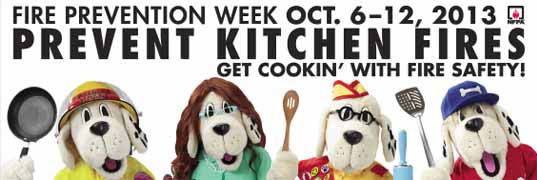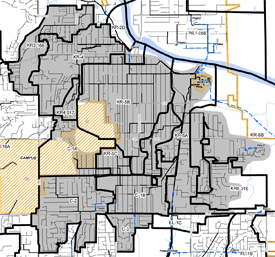In this month’s issue…
- Get Cookin’ With Fire Safety!
- Don’t rake leaves into the drain
- City Kicks Off Program to Reduce Inflow & Infiltration in Sewer System
- Electronic Recycling Event – November 9
Get Cookin’ With Fire Safety!
LDCFM working to prevent kitchen and cooking fires

Did you know that cooking is the leading cause of home fires? Two of every five home fires begin in the kitchen — more than any other place in the home. Cooking fires are also the leading cause of home fire-related injuries. This October, firefighters will be spreading the word about the dangers of kitchen fires — most of which result from unattended cooking — and teaching local residents how to prevent kitchen fires from starting in the first place.
“Often when we’re called to a fire that started in the kitchen, the residents tell us that they only left the kitchen for a few minutes,” said Fire Chief Mark Bradford. “Sadly, that’s all it takes for a dangerous fire to start. We hope that Fire Prevention Week will help us reach folks in the community before they’ve suffered a damaging lesson.”
Among the safety tips that firefighters and safety advocates will be emphasizing:
- Stay in the kitchen when you are frying, grilling, broiling or boiling food.
- If you must leave the room, even for a short period of time, turn off the stove.
- When you are simmering, baking or roasting food, check it regularly, stay in the home, and use a timer to remind you.
- If you have young children, use the stove’s back burners whenever possible. Keep children and pets at least three-feet away from the stove.
- When you cook, wear clothing with tight-fitting sleeves.
- Keep pot holders, oven mitts, wooden utensils, paper and plastic bags, towels and anything else that can burn, away from your stove top.
- Clean up food and grease from burners and stove tops.
Visit www.firepreventionweek.org for more information.
Raking Your Leaves?

Please don’t rake leaves into the street or storm drains
Streets are part of our stormwater drainage system. Leaves left along the curb can enter storm drains, increasing the risk of localized flooding and adding pollutants to the receiving streams and rivers. The city’s street sweepers are unable to pick up large volumes of leaves.
When you’re raking your yard this fall, remember that leaves, grass clippings and other yard trimmings should be composted, taken to the city’s compost facility at 1420 E. 11th Street during operating hours on Saturdays or placed in city carts, cans or compostable paper bags and set out for Monday pick-up.
For more information on the city’s stormwater system, visit www.lawrenceks.org/mso/stormwater.
City Kicks Off Program to Reduce Inflow & Infiltration in Sewer System

Over the next 8 years, the city will perform inspections on hundreds of thousands of feet of sanitary sewer lines throughout Lawrence. The map’s grey-shaded areas show where inspections are planned.
The 2012 Wastewater Master Plan and Capital Improvements Program recommended the implementation of a Rapid Inflow and Infiltration (I/I) Reduction Program. Inflow and Infiltration are terms used to describe the ways that groundwater and storm water or “clear water” enters the sanitary sewer system. Inflow is surface water that enters the sewer system from yards, roof and footing drains, cross-connections with storm drains, downspouts, and through holes in manhole covers. Infiltration is groundwater that enters sewer pipes through holes, breaks, joint and connection failures, and other openings. The objective of the Rapid I/I Reduction Program is an overall 35% reduction of I/I within the program area. By reducing I/I by 35%, we decrease the need for construction projects that add system capacity within the sewer system and the need for wet weather treatment capacity expansion at the Kaw Wastewater Treatment Plant.
The Rapid I/I Reduction Program will study, rehabilitate and monitor the public and private sanitary sewer systems in identified areas. The study will include a combination of activities including monitoring of flow levels, smoke testing the sewer lines to locate leaks and cracks, TV inspections to inspect the sewer lines, manhole inspections to determine leaking, and building evaluations to identify improper plumbing connections.
The city has contracted with TREKK Design Group to perform Phase I of the I/I program. The city has begun its initial analysis of certain areas of Lawrence but the entire program is estimated to take eight years to complete. In Phase I alone, the city will smoke test 100,000 feet of sanitary sewers, inspect 501 manholes for defects, complete 17,400 feet of inspections through closed-circuit television, and evaluate 1,450 buildings.
Throughout the Rapid I/I Reduction Program, city staff and TREKK project managers will notify residents in areas where activities are taking place through door hanger notifications, signage, and assure that all employees and vehicles are clearly identifiable. As the building evaluations begin later this year, city staff and TREKK project managers will work closely with property owners to determine any plumbing corrections that are needed, as well as have staff be available for any questions or concerns that may arise. Visit www.lawrenceks.org/mso/utility_projects for more information on this program and the Capital Improvements Program.
Electronic Recycling Event – November 9

The City of Lawrence will host an electronic recycling event on Saturday, November 9th from 9:00 a.m. to 1:00 p.m. in the Free State High School north parking lot, 4700 Overland Drive.
Items accepted for recycling include televisions, video and audio equipment, computers, printers, scanners, fax machines, microwaves and other small appliances, cell phones and other hand held devices. There is a $15 recycling fee per CRT television under 27 inches and a $35 recycling fee per CRT television over 27 inches/all big screen televisions/all console televisions. There is no recycling fee for other electronic equipment, including computer monitors. Fees may be paid by cash or check.
Items not accepted at this event include large appliances and household hazardous waste such as fluorescent light bulbs, paint, pesticides, and compressed gas cylinders.
Electronic recycling at this event will be provided by MRC Electronic Recyclers.
www.LawrenceRecycles.org
